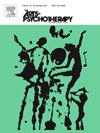音乐治疗对老年抑郁症的影响因素及机制:一项范围综述
IF 1.5
3区 心理学
Q3 PSYCHOLOGY, CLINICAL
引用次数: 0
摘要
由于人口老龄化日益严重,估计患有晚年抑郁症(LLD)的人数将显著增加。LLD的症状包括持续的情绪低落,兴趣和愉悦感下降,以及无价值感。音乐疗法在缓解这一人群的抑郁症状方面已被证明有效。然而,对其治疗因素和改变机制的了解仍然有限。本综述旨在阐明音乐治疗对LLD患者的治疗因素、改变机制及其相关结果。系统检索了Medline、Cinahl、Psycinfo、Cochrane、Embase、Web of Science、谷歌Scholar等数据库。选择标准包括老年人(60岁以上)、晚年抑郁症、音乐疗法、治疗因素和改变机制。在1249项被筛选的研究中,31项被纳入,确定了5个假定的治疗因素、假定的改变机制和相关的假定结果领域。这些领域包括情感、社会、认知、觉醒和行为;动机。情绪领域,包括假设的治疗因素和假设的情绪调节变化机制,是最突出的。音乐聆听和互动音乐制作都可以通过唤起和表达LLD患者的困难感受来促进情绪调节。对LLD患者音乐治疗的治疗因素和机制变化的见解可以为策略制定提供信息,加强临床护理,并指导未来的研究工作。本文章由计算机程序翻译,如有差异,请以英文原文为准。
Therapeutic factors and mechanisms of change in music therapy for people with late-life depression: A scoping review
Due to the growing aging population, the number of people with late-life depression (LLD) is estimated to increase significantly. LLD presents symptoms such as persistent low mood, decreased interest and pleasure, and feelings of worthlessness. Music therapy has demonstrated efficacy in alleviating depressive symptoms in this population. However, understanding of its therapeutic factors and mechanisms of change remain limited. This scoping review aims to elucidate the therapeutic factors, mechanisms of change and their related outcomes involved in music therapy for people with LLD. Databases including Medline, Cinahl, Psycinfo, Cochrane, Embase, Web of Science, and Google Scholar were systematically searched. Selection criteria included elderly individuals (above 60), late-life depression, music therapy, therapeutic factors and mechanisms of change. Of 1249 screened studies, 31 were included, identifying 5 domains of presumed therapeutic factors, presumed mechanisms of change and related presumed outcomes. The domains are emotion, social, cognition, arousal and behavior & motivation. The emotion domain, which encompasses presumed therapeutic factors and presumed mechanisms of change for emotion regulation emerged as the most prominent. Both music listening and interactive music making facilitate emotion regulation by evoking and expressing difficult feelings in people with LLD. Insights gained on therapeutic factors and mechanisms of change involved in music therapy for people with LLD can inform strategy development, enhance clinical care, and guide future research efforts.
求助全文
通过发布文献求助,成功后即可免费获取论文全文。
去求助
来源期刊

Arts in Psychotherapy
Multiple-
CiteScore
3.20
自引率
11.10%
发文量
66
期刊介绍:
The Arts in Psychotherapy is a dynamic, contemporary journal publishing evidence-based research, expert opinion, theoretical positions, and case material on a wide range of topics intersecting the fields of mental health and creative arts therapies. It is an international peer-reviewed journal publishing 5 issues annually. Papers are welcomed from researchers and practitioners in the fields of art, dance/movement, drama, music, and poetry psychotherapy, as well as expressive and creative arts therapy, neuroscience, psychiatry, education, allied health, and psychology that aim to engage high level theoretical concepts with the rigor of professional practice. The journal welcomes contributions that present new and emergent knowledge about the role of the arts in healthcare, and engage a critical discourse relevant to an international readership that can inform the development of new services and the refinement of existing policies and practices. There is no restriction on research methods and review papers are welcome. From time to time the journal publishes special issues on topics warranting a distinctive focus relevant to the stated goals and scope of the publication.
 求助内容:
求助内容: 应助结果提醒方式:
应助结果提醒方式:


